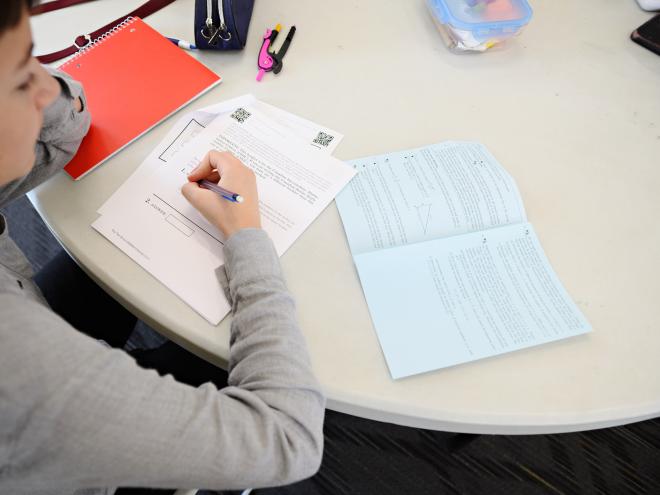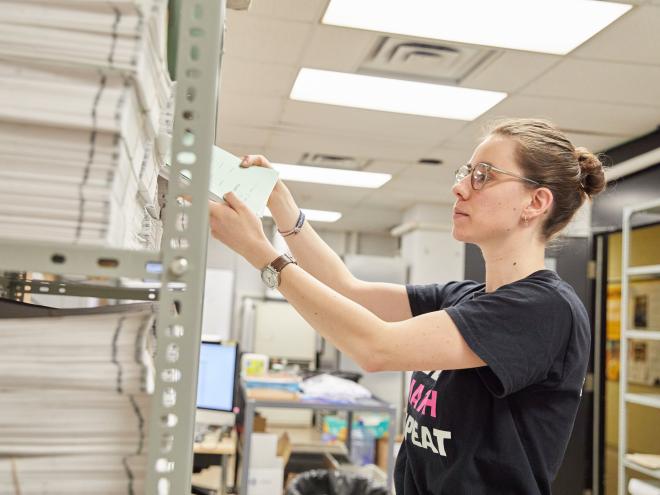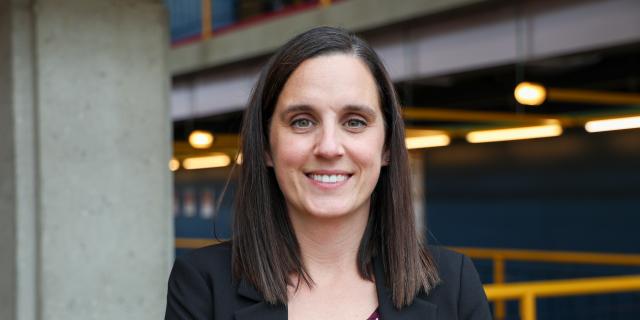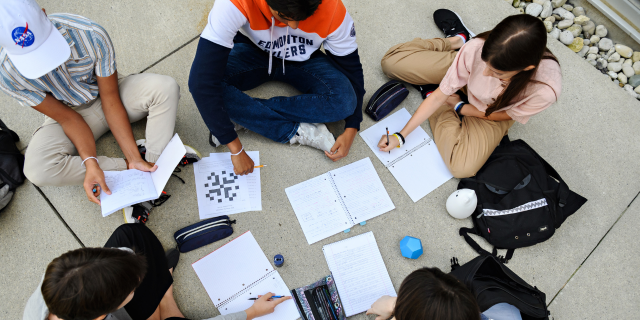
Internationally recognized mathematics and computing contests
Mathematics and computing contests are a fun way for students to grow their problem-solving skills, build confidence and get creative with math and computer science. Designed by teams of expert mathematicians and educators for Grades 5 to 12, CEMC contests are a great fit for students across a range of abilities—from learners who want to explore math and computer science and develop their confidence to advanced students who want to stretch their limits.
CEMC mathematics and computing contests
In the table below, you will find information about all CEMC contests, contest dates and ordering deadlines for the contest year 2025/26. We will begin accepting contest orders for the 2025/26 contest year in September 2025.
These contests are available in English and French.
- Contest dates:
- North and South America: Wednesday, November 12, 2025
- Outside North and South America: Thursday, November 13, 2025
- Ordering deadline: Thursday, October 16, 2025
These contests are available in English and French.
- Contest dates:
- North and South America: Wednesday, February 25, 2026
- Outside North and South America: Thursday, February 26, 2026
- Ordering deadline:
- Schools in India: Tuesday, January 27, 2026
- Schools outside of Canada and India: Tuesday, February 3, 2026
- Schools in Canada: Tuesday, February 10, 2026
This contest is available in English and French.
- Contest dates:
- North and South America: Tuesday, March 31, 2026
- Outside North and South America: Wednesday, April 1, 2026
- Ordering deadline: Thursday, March 5, 2026
These contests are available in English and French.
- Contest dates:
- North and South America: Wednesday, April 1, 2026
- Outside North and South America: Thursday, April 2, 2026
- Ordering deadline: Thursday, March 5, 2026
This contest is available in English only.
- Contest dates:
- North and South America:
- At UWaterloo: Wednesday, April 8, 2026
- In Schools: Thursday, April 9, 2026, or later
- Outside North and South America:
- In Schools: Thursday, April 9, 2026, or later
- North and South America:
- Ordering deadline:
- Registration deadline for the lottery to participate at UWaterloo: Thursday, November 20, 2025
- In-school event: Monday, April 6, 2026
These contests are available in English and French.
- Contest dates:
- North and South America: Wednesday, May 13, 2026
- Outside North and South America: Thursday, May 14, 2026
- Ordering deadline: Thursday, April 23, 2026
This resource is available in English and French.
- Contest dates: Monday, June 1, 2026, or later
- Ordering deadline: Thursday, May 28, 2026

Benefits of participating in a CEMC contest
CEMC contests help participants:
- discover and grow a love of mathematics and computing,
- foster creative problem-solving, critical thinking, and analytical skills, and
- learn about new concepts to make connections across topics in mathematics and computing.
Since CEMC contests are challenging yet achievable activities for young learners, they also build students' confidence in their ability to tackle difficult problems — a key ingredient for student success both inside and outside the classroom.
How to participate in CEMC contests
Each year, educators order CEMC contests for over 300 000 students worldwide, reaching students in over 85 countries. Students cannot register for contests on their own. They must be registered by their school. If their own school is not participating, students can look for another local school that will allow them to join as a participant.
Below are the steps that educators can follow to help their students participate in CEMC contests:
A school must have a CEMC school account to order contests. If your school does not have an account, please submit a new school application. Account creation is not automatic and can take up to three weeks to be manually reviewed. Please keep this timeline in mind when submitting your application.
After creating your CEMC school account, we will provide a nine-digit CEMC School Number and a confidential password for online orders. These details are also required by educators to access participants' results after the contests are marked. The CEMC School Number and password are emailed to the Head of Math contact registered on the CEMC School Account each September for previously registered schools. If you didn't receive your CEMC School Number and password, do not fill out a New School Application Form. Head of Math contacts can retrieve their login information through the "Login Help/Aide Login" by submitting their email address. If you still can't retrieve your login information, please email us or call (519) 888-4808.
School accounts are not individual educator accounts. If an educator changes schools, they should not use their old school account but should check with their new school if they have a CEMC school account.
Students who are working ahead by one or more grades or more may choose to write the contest for the more advanced grade but cannot write a contest that is below their official grade level. Additionally, students can only write one of the contests in each of the following grouping of contests in a given school year:
- Pascal, Cayley and Fermat Contests,
- Fryer, Galois and Hypatia Contests,
- Canadian Intermediate Math Contest and Canadian Senior Mathematics Contest,
- Grade 5/6, Grade 7/8 and Grade 9/10 Beaver Computing Challenge,
- Grade 7 and Grade 8 Gauss Contests.
If a participant writes more than one contest in a contest grouping, only the results of the appropriate grade contest will be recorded.
Educators will use the CEMC School Number and confidential password assigned to the school to order contests on the CEMC Contest Supervisor Portal.
In the weeks leading up to the contest, educators receive all necessary materials to supervise the contest via mail, email and electronically via the Contest Supervisor Portal depending upon the mode of the contest.
Writing a contest is more than about the actual result obtained; they are also about the practice of problem-solving, the encouragement of teamwork, and the experience of participation. We recommend that students spend time preparing for our contests, as practice is the best way to develop problem-solving skills.
Below are links to five types of resources and classroom support:
- Past Contests: Students can review past contests to become familiar with the contest format, level of difficulty, and time management strategies. The CEMC has made available a wide range of past contests and their solutions in the Past Contests section of Tools and Resources.
- Problem-Set Generator: Students, educators and guardians can create their own sets of randomized problems from past Gauss, Pascal, Cayley and Fermat Contests using the CEMC’s free, online Problem-Set Generator tool.
- Math Courseware: Students can use CEMC’s free, online Courseware to review and reinforce important curriculum content and concepts.
- Euclid and Canadian Senior Mathematics Contest (CSMC) Preparation Materials: Participants can access our updated preparation materials which are specifically designed for the Euclid and Canadian Senior Mathematics Contest (CSMC).
- CEMC Visits Schools: Experts from the CEMC are available to conduct problem-solving workshops for students and educators. Visit CEMC Visits Schools to learn more.
All participants must attempt the contest at the same time in the classroom under the supervision of an educator or school staff member, regardless of whether the contest is online or hand-written. The contests cannot be taken remotely or unsupervised. Additional instructions on contest supervision can be found in the Contest Instructions document, which is either included in the contest package or shared electronically in the Contest Supervisor Portal.
Please note that a contest can never be written before the official contest date. We will do our best to arrange alternate dates for significant school-wide conflicts. Please contact us if you wish to arrange this.
Schools are required to send paper contests and Scantron forms back to the CEMC via courier for marking for the Canadian Senior and Intermediate Mathematics Contests, Pascal, Cayley and Fermat, Euclid, Fryer, Galois, and Hypatia Contests. Schools do not send back paper contests for the online Pascal, Cayley and Fermat Contests, Gauss Contests, Canadian Team Mathematics Contest, and Team Up Challenge. Online contests are submitted automatically. It is important for schools to return all completed contest materials to CEMC in one package for marking. In order for your results to be included in the final results, it is strongly recommended that you return the contests immediately after completion of the contests by courier so that they reach the CEMC on time. Schools are responsible for the cost of returning contest materials.
After marking is complete, results are made accessible to the Contest Supervisor in the Results and Certificates section of the Contest Supervisor Portal. The portal also includes a certificate generator that Contest Supervisors can use to print certificates for all contests.
Details about averages and cutoffs, awards and recognition and results booklets can be found in the corresponding section in each contest’s webpage. Where applicable, awards are sent to the school for top-performing students. Top-performing students may also be featured in publicly accessible annual honour roll documents or may be eligible for additional awards or accolades.
2025/26 Tentative Contest Posters:
2024/25 Contest Posters:
2024/25 Contest Flyers:

How we create contests
CEMC contests are crafted through collaboration among mathematics and computer science educators. They design problems that reflect curriculum topics, promote critical thinking, and encourage creativity, ensuring clarity, correctness, and appropriateness for each grade level. These contests aim to provide engaging and challenging experiences that foster students' mathematical and computational skills.




